Asked about the state of America’s energy supply, 64% say the more important priority for the country should be expanding production of wind, solar and hydrogen power. A smaller share (35%) takes the opposite view, giving greater priority to expanding the exploration and production of oil, coal and natural gas.
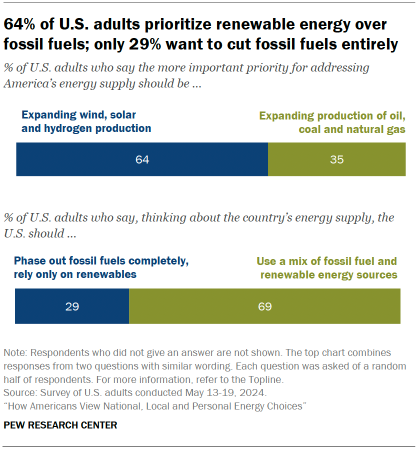
Still, relatively few Americans think the country should break with fossil fuels entirely. About seven-in-ten (69%) say the country should use a mix of sources like wind and solar in addition to oil, coal and natural gas. By contrast, 29% say the country should phase out oil, coal and natural gas completely and rely only on renewable energy sources.
Views by party
Among Republicans and Republican leaners, 60% give priority to expanding production of oil, coal and natural gas. And 88% say fossil fuels should remain part of the country’s energy mix.
By contrast, most Democrats and Democratic leaners (87%) give priority to the production of wind, solar and hydrogen energy sources. But Democrats are more closely divided over the question of whether to break with fossil fuels altogether: 53% support using a mix of energy sources that includes both renewables and fossil fuels, compared with 45% who support phasing out the use of oil, coal and natural gas entirely.

Over the last several years, Democrats have been consistent in their broad support for prioritizing renewable energy sources like wind and solar. At least 87% have prioritized renewable energy sources in each survey dating back to 2019.
By contrast, there was a major shift toward fossil fuels among Republicans following the 2020 election, with continued movement in this direction in the last several years. Since 2020, the share of Republicans who say they prioritize developing renewable energy over expanding fossil fuels is down 27 percentage points, from 65% to 38%. There has been a corresponding 26-point increase in the share of Republicans who give priority to developing oil, coal and natural gas (from 35% to 61%).
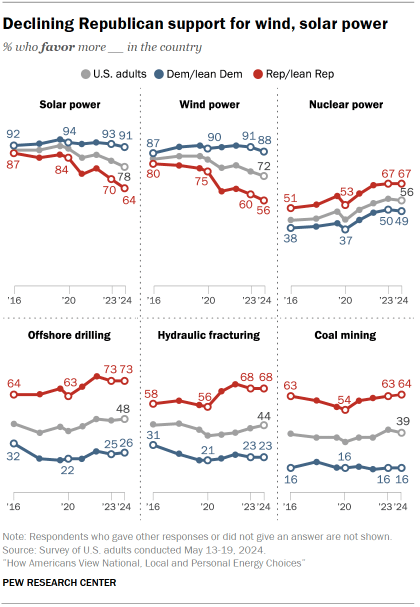
Asked to consider a range of energy sources individually, majorities of Americans say they support more solar panel farms (78%) and more wind power farms (72%). A smaller majority (56%) also supports more nuclear power plants to generate electricity.
By contrast, there is less support for specific forms of fossil fuel development. Fewer than half support more offshore oil and gas drilling (48%), more hydraulic fracturing – sometimes called “fracking” – for oil and gas (44%) or more coal mining (39%).
While still broadly popular with the public, support for more solar and wind power has fallen in recent years due to major declines among Republicans.
There is greater support for nuclear power today than in 2020, with both Republicans and Democrats expressing more positive views.
Support for more offshore drilling, hydraulic fracturing and coal mining is somewhat higher today than in 2020 due to significant increases in support among Republicans. For example, 68% of Republicans now support more hydraulic fracturing, up from 56% in 2020.
Age differences among Republicans in energy attitudes
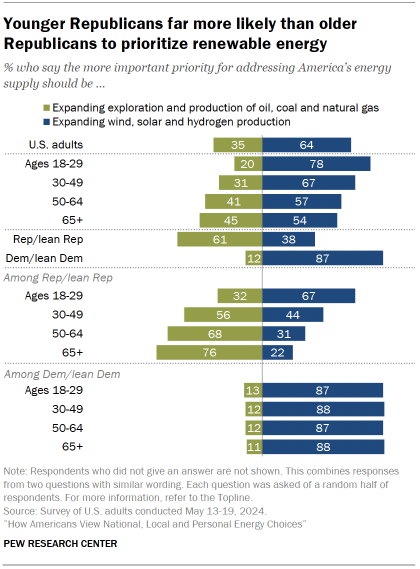
Among Republicans, younger adults stand out for being much more supportive of renewable energy than their older counterparts.
When asked whether developing renewable energy or fossil fuel sources should be the more important priority, two-thirds of Republicans ages 18 to 29 prioritize renewable energy production. By contrast, about three-quarters of Republicans ages 65 and older (76%) prioritize developing production from oil, coal and natural gas.
Almost all Democrats, regardless of age, prioritize developing renewable energy sources such as wind and solar.
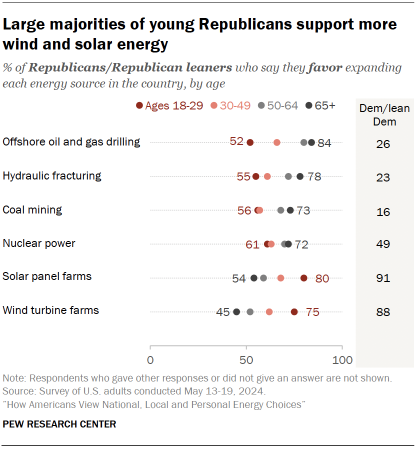
When it comes to specific energy sources, younger Republicans are more likely to favor expanding wind and solar power while older Republicans are more likely to favor more offshore oil and gas drilling, hydraulic fracturing and coal mining.
On wind and solar:
- Republicans ages 18 to 29 are 30 points more likely than Republicans ages 65 and older to favor more wind power (75% vs. 45%) and 26 points more likely to favor more solar power (80% vs. 54%).
On offshore oil and gas drilling:
- 84% of Republicans ages 65 and older favor more offshore oil and gas drilling, compared with 52% of Republicans ages 18 to 29.
Older Republicans are also more likely than the youngest Republicans to support more hydraulic fracturing and coal mining.
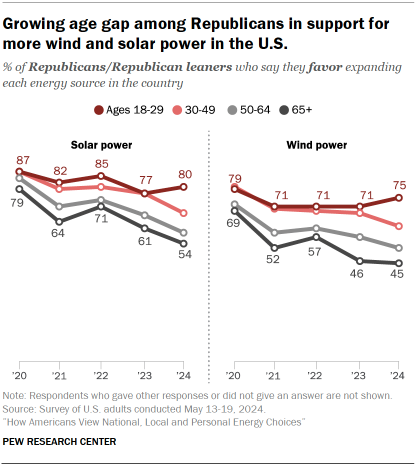
The current GOP age gaps in support for wind and solar energy are a result of shifts that have taken place over the last four years. Support has fallen sharply among older Republicans, while views among those under 30 have changed only modestly. For example:
- Among Republicans ages 65 and older, support for more solar power has declined by 25 points since 2020 and support for more wind power has fallen by 24 points.
- Among Republicans ages 18 to 29, there have been single-digit declines in support for more solar and wind power over this timespan (down 7 points and 4 points, respectively).




